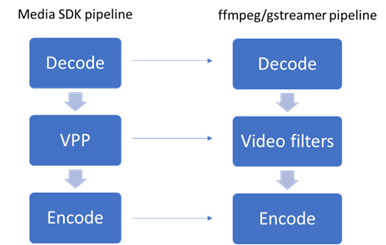Upgrading from Intel® Media SDK to Intel® oneAPI Video Processing Library
Transition from Intel® Media SDK to Media Frameworks and oneVPL Plugins
To get the benefits of Intel(R) oneVPL access to GPU hardware acceleration, use industry-standard media frameworks plugins, such as FFmpeg* or GStreamer*.
Use media framework plugins if your project requires:
Portability across accelerator types, for example, CPU and GPU.
Portability across hardware vendors.
Media container formats.
Network streaming protocols.
Audio.
Compatibility with the existing code based on media frameworks.
The use via higher-level languages such as Python.
Fast TTM/high-level access to basic decode, video filter, and encode.
Code porting happens as high-level functional blocks. Below the decode, frame processing, and encode level, there is no clear mapping between Intel(R) Media SDK and VPL functions and abstractions to FFmpeg*/GStreamer*.

Porting requires some work, but there are significant benefits. FFmpeg* and GStreamer* are the accepted industry standards for cross-accelerator/cross-vendor. From a CPU codec perspective, media framework codecs are a clear upgrade because of it provides you with:
Access to the latest open-sourced CPU codec improvements.
Access to a broader range of CPU codecs, much more than is accessible via Media SDK or VPL.
Access to many CPU codec features and parameters.
Better performance when using FFmpeg* codecs directly vs. FFmpeg* codecs via VPL-CPU glue code.